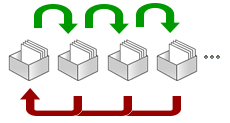| Developer(s) | KCP Technologies, Concord Consortium |
|---|---|
| Stable release | 2.3 / May 2015 |
| Operating system | Windows XP, Windows 7, Windows 8; Mac OS X 10.6 to MacOS 10.14 |
| Type | Educational software |
| License | Proprietary |
| Website | fathom |
Fathom Dynamic Data Software is software for learning and teaching statistics, at the high school and introductory college level.

A mind map is a diagram used to visually organize information into a hierarchy, showing relationships among pieces of the whole. It is often based on a single concept, drawn as an image in the center of a blank page, to which associated representations of ideas such as images, words and parts of words are added. Major ideas are connected directly to the central concept, and other ideas branch out from those major ideas.
Data mining is the process of extracting and discovering patterns in large data sets involving methods at the intersection of machine learning, statistics, and database systems. Data mining is an interdisciplinary subfield of computer science and statistics with an overall goal of extracting information from a data set and transforming the information into a comprehensible structure for further use. Data mining is the analysis step of the "knowledge discovery in databases" process, or KDD. Aside from the raw analysis step, it also involves database and data management aspects, data pre-processing, model and inference considerations, interestingness metrics, complexity considerations, post-processing of discovered structures, visualization, and online updating.
Documentation is any communicable material that is used to describe, explain or instruct regarding some attributes of an object, system or procedure, such as its parts, assembly, installation, maintenance, and use. As a form of knowledge management and knowledge organization, documentation can be provided on paper, online, or on digital or analog media, such as audio tape or CDs. Examples are user guides, white papers, online help, and quick-reference guides. Paper or hard-copy documentation has become less common. Documentation is often distributed via websites, software products, and other online applications.
Machine learning (ML) is a field of study in artificial intelligence concerned with the development and study of statistical algorithms that can learn from data and generalize to unseen data, and thus perform tasks without explicit instructions. Advances in the field of deep learning have allowed neural networks to surpass many previous approaches in performance.
JumpStart was an educational media franchise created for children, primarily consisting of educational games. The franchise began with independent developer Fanfare Software's 1994 video game JumpStart Kindergarten. The series was expanded into other age groups and beyond games to include workbooks, direct-to-video films, mobile apps, and other media under the ownership of Knowledge Adventure, which later assumed the name JumpStart Games.
Educational software is a term used for any computer software that is made for an educational purpose. It encompasses different ranges from language learning software to classroom management software to reference software. The purpose of all this software is to make some part of education more effective and efficient.

A computer lab is a space where computer services are provided to a defined community. These are typically public libraries and academic institutions. Generally, users must follow a certain user policy to retain access to the computers. This usually consists of rules such as no illegal activity during use or attempts to circumvent any security or content-control software while using the computers.

A flashcard or flash card is a card bearing information on both sides, which is intended to be used as an aid in memorization. Each flashcard typically bears a question or definition on one side and an answer or target term on the other. Flashcards are often used to memorize vocabulary, historical dates, formulae or any subject matter that can be learned via a question-and-answer format. Flashcards can be virtual, or physical.
Inspection in software engineering, refers to peer review of any work product by trained individuals who look for defects using a well defined process. An inspection might also be referred to as a Fagan inspection after Michael Fagan, the creator of a very popular software inspection process.
A learning management system (LMS) or virtual learning environment (VLE) is a software application for the administration, documentation, tracking, reporting, automation, and delivery of educational courses, training programs, materials or learning and development programs. The learning management system concept emerged directly from e-Learning. Learning management systems make up the largest segment of the learning system market. The first introduction of the LMS was in the late 1990s. LMSs have been adopted by almost all higher education institutions in the English-speaking world. Learning management systems have faced a massive growth in usage due to the emphasis on remote learning during the COVID-19 pandemic.

Rosetta Stone Language Learning is proprietary, computer-assisted language learning (CALL) software published by Rosetta Stone Inc, part of the IXL Learning family of products. The software uses images, text, and sound to teach words and grammar by spaced repetition, without translation. Rosetta Stone calls its approach Dynamic Immersion.

Reader Rabbit is an educational video game franchise created in 1984 by The Learning Company. The series is aimed at children from infancy to the age of nine. In 1998, a spiritual successor series called The ClueFinders was released for older students aged seven to twelve.

Star Wars: DroidWorks is a 1998 edutainment computer game and the premiere title from LucasArts subsidiary Lucas Learning. It uses the same engine as LucasArts' previous title Star Wars: Jedi Knight. The creators aimed to create a game that would be both appealing and nonviolent. The game's original release date was moved up by months, which resulted in the development team cutting some planned game features.

Mnemosyne is a line of spaced repetition software developed since 2003. Spaced repetition is an evidence-based learning technique that has been shown to increase the rate of memorization.

PSPP is a free software application for analysis of sampled data, intended as a free alternative for IBM SPSS Statistics. It has a graphical user interface and conventional command-line interface. It is written in C and uses GNU Scientific Library for its mathematical routines. The name has "no official acronymic expansion".

Free content, libre content, libre information, or free information is any kind of creative work, such as a work of art, a book, a software program, or any other creative content for which there are very minimal copyright and other legal limitations on usage, modification and distribution. These are works or expressions which can be freely studied, applied, copied and modified by anyone for any purpose including, in some cases, commercial purposes. Free content encompasses all works in the public domain and also those copyrighted works whose licenses honor and uphold the definition of free cultural work.

The Pomodoro Technique is a time management method developed by Francesco Cirillo in the late 1980s. It uses a kitchen timer to break work into intervals, typically 25 minutes in length, separated by short breaks. Each interval is known as a pomodoro, from the Italian word for tomato, after the tomato-shaped kitchen timer Cirillo used as a university student.
Madeline is a series of educational point-and-click adventure video games which were developed during the mid-1990s for Windows and Mac systems. The games are an extension of the Madeline series of children's books by Ludwig Bemelmans, which describe the adventures of a young French girl. The video-game series was produced concurrently with a TV series of the same name, with characters and voice actors from the show.
The Arthur video games franchise was a series of learning and interactive story video games based on the American-Canadian children's TV show Arthur. The games were released in the 1990s and 2000s for PlayStation and Game Boy Color alongside Windows and Mac OS computers.

Star Wars: Pit Droids is an educational puzzle game developed and published by Lucas Learning. It was originally released for Microsoft Windows and Macintosh on September 13, 1999. It was later ported to iOS and released on February 9, 2012. The game develops skills such as hypothesis testing and geometry.